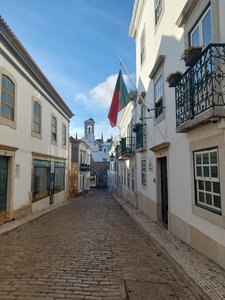One who wishes to pursue an academic career in geosciences must, ideally, be up to date with a variety of research topics, a task which is often proven to be very challenging due to the amount of attention that our graduate projects demand from us. In these times, when we find ourselves too focused on specific research subjects, it is very beneficial to “get some fresh air”, and a great way to do so is to take part in an event where you can discuss your research with peers, learn about how diverse their works can be an improve your expertise and understanding of concepts and methods related to your field altogether.
For that reason, I thank the GSGS for supporting my attendance in the Marine Biogeochemistry Training Week (30.05.22 - 03.06.22), a hybrid one-week course that took place in Faro (Portugal), organized by the Centre of Marine Sciences (CCMAR), a research organization within the University of the Algarve. Through a series of lectures given by specialists, the main goal of this training week was to capacitate its attendees in state-of-the-art themes related to ocean biogeochemical processes and cycles, the scientific tools applied to investigate them, and how these processes are changing and being affected by human activity.
With the lectures, the participants had the chance to improve their knowledge about the interplay between important chemical, biological and physical oceanic processes – from today and through geological time. Amongst the many topics covered in this course, the participants were trained to address questions like: How are the major nutrients essential to life distributed in the modern ocean? What are the impacts of global ocean circulation on climate? How does the chemical distribution of elements interact with biological processes? How can changes in such distributions inform us about climate change? What is the role of the Carbon cycle in the climate system? How can we reconstruct past changes in the atmosphere-land-ocean interactions?
The course, however, did not only cover technical knowledge regarding the oceanic systems, but also relevant soft skills related to science communication, which are essential, since we are not communicating our findings to the general public in the same way we write a scientific publication, and it is our duty as scientists to make sure our results outreach to society. Besides the theoretical and practical activities conducted during the training week, the 40 participants gathered in this event – that ranged from bachelor students to post-docs – had the opportunity to share their ongoing research with their peers and lecturers.
Overall, the Marine Biogeochemistry Training Week was a great chance to meet my peers, the specialists that inspire me, and to improve my knowledge of the main ocean processes, essential for the development of my graduate project, which aims to comprehend past ocean changes based on biogeochemical and paleoecological analyses.
Tiago Menezes Freire
PhD student
Institute of Geology and Mineralogy
PhD project: “Surface variability of the Eastern Boundary Current off Chile during the Early and middle Miocene”
